Issue Number 65, Summer 2024
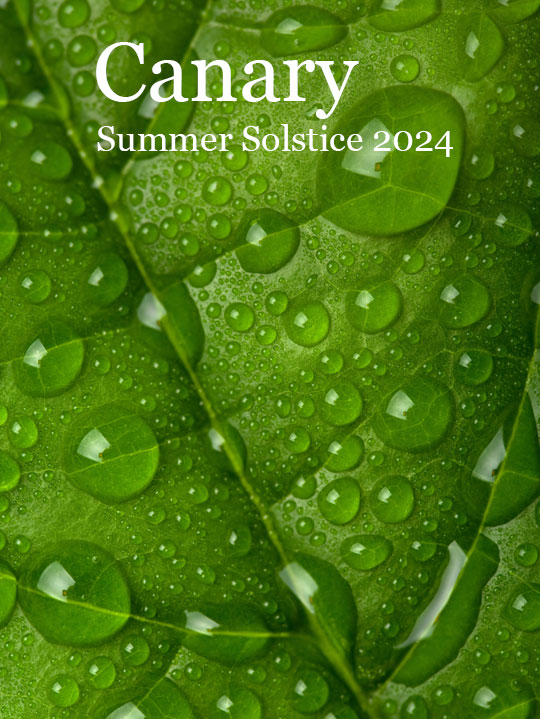
Contents
- The Longest Day by Peter Neil Carroll
- Arboretums by Angela Townsend
- The Smoke of August by Mark Simpson
- An Elegy for Franklin Ware, Dead before the Fire Came by Mark Simpson
- Jewel Lake, 1994 by Allison Luterman
- Not the War by Brett Warren
- Oh, the Beautiful Green Grass. 1999 by Laura Budofsky Wisniewski
- Motherhood by Amy Allen
- Garden Date by Amy Allen
- Being There by Ronald J. Pelias
- To the Eyeless Wolf Spider of Kauai’s Lava Tubes by Derek Otsuji
- To the Hawaiian Goby by Derek Otsuji
- What We Created When We Created the Brilliant Sky by Ken Holland
- Wet by Sue Proffitt
- Bull Shark Scuba Dive by Courtney Hitson
- The Turn of the Snail by Wendi White
- Losing Waikiki by Wendi White
- When the Old Place Went by Geralyn Pinto
- American Sonnet in Rome by Daisy Bassen
- Stung by Daisy Bassen
- Seabird by Samantha Imperi
- Elafonisi by Jacob Friesenhahn
- Humidity by Alan Perry
- Talking to Children after all the Bees are Gone by Sharon Pretti
- Imagine Rain by Charlotte Melin
- Rampant Garden by Charlotte Melin
- That We Don’t Move Fast Enough by Michelle Hendrixson-Miller
- Melipona Gold by Karen McAferty Morris
- Red Panda by Bradley Samore
- Armadillos, Motherhood, and My Divorce by Isobella Jade
- Summer Solstice by Monica Stillman
Archives: by Issue | by Author Name

The Longest Day
by Peter Neil Carroll
Peter Neil Carroll lives in the foothills east of Half Moon Bay where the wind off the Pacific keeps the heat waves away.

I wait a year for the day
light lasts longest, one minute
more than yesterday,
that minute everything
though today thick clouds refuse
to burn away. It’s not
sunshine I crave
but clarity. Even without
the orange flash at sundown, I want
one minute more. Tomorrow
comes the tilt, blue globe tumbling
into the orbit of night.
© Peter Neil Carroll

Arboretums
by Angela Townsend
Angela lives where the Neshaminy Creek befriends the Tohickon and red maples can't contain their enthusiasm.

Once you have taken refuge, you remain a citizen of the trees. There is an international agreement, signed by saplings as lean as cheese sticks and pillars no arms can circle. I was unaware of protocol when I parked my car on the first Sunday. My tailbone was too bony for the pew, but it was April, which is holy.
I had passed the Hunterdon County Arboretum for years, driving too fast to hear its air. It appeared to be a lethargic brown building ringed with portable toilets. A single oak leaned in sympathy, its branches dusting the roof: “There, there.”
A milestone birthday hung humid, and my earth grew soft. Wind somersaulted canyons I did not know I contained. My mother suggested I try online dating. I bought a magenta selfie stick and drove to the arboretum.
Trees have mercy on the mercenary. They knew I let succulents die rather than risk soiled knuckles. I offered no cover for my mission. I was here to flatter my face, shoplifting sunlight. I had flat-ironed my bangs and inserted red earrings. I took one picture and made discoveries. I never knew that my chin is rutty as a peach pit, and my eyes implode when I smile.
I took a picture of my upturned hands. I zoomed in on fingertips and saw spiral galaxies. I turned the camera in a better direction and entered the arboretum.
I could not identify species. Trees do not give entrance exams. My whorls had never felt so famished for touch. I was grabby, feeling the fast break. The oatmeal tree had bumps like overdue poems. The kitten tree let me grasp it like a baton. Oaks oversaw a congress where every vote was unanimous.
Everything green gives grace to the suburban tame. Trees breathe liturgy into lungs profaned by air conditioning. A child’s hand had engraved “Wizard Walk” on a slab. I slipped out of my ballet flats out of respect for the clover. I was learning. I soaked my knee-high stockings and found yellow flowers the size of mini muffins. I apologized to the yellow flowers for comparing them to mini muffins.
Apologies are not accepted in the arboretum. You are asked only to remember. I forgot the Chevrolets on the bypass and the tiny boxes of men on the dating site. There was no one else at the arboretum, even though it was April. I awarded oaks with hugs I once learned from my Sicilian grandmother. Lichens told me naughty jokes. I wondered if selfie sticks are recyclable.
I returned, returned, and returned. I had found three safe acres under heaven. I downloaded an app to identify my patrons. I still called them by the names they’d told me, Celestine and Andromeda and DJ Pimento. But now I knew what the moonlight called them, Acer negundo and Acer rubrum and Pinus strobus. I could tell my begonia from my portulaca. When I got home, I could tell my cheeks and chin were changing for the pinker.
The children in the arboretum allow you to call them “mine,” as long as you do not forget that you have become theirs. Belonging is nonrefundable and irrevocable.
Belonging persists, even if you crawl into one of the boxes with one of the men and change states. Nothing green can hurry, but I did. I squinted until I convinced myself I saw a wizard. My eyes disappeared whether or not I smiled.
We both knew we had razed the garden. We believed X marked the spot, and we tore the earth like cannibals. The chest was empty.
My heart was still beating. There was an arboretum on the edge of our new city. It was a king-sized quilt in comparison to Hunterdon’s calico patch. We entered in November, and the man beat his chest, hurly-burly down the rope bridge. November was his birth month, he repeated. He was born in this city. This was his.
The trees were large. The man ran up the katsura like a guerrilla up a wall. I laid my hand upon its solar plexus and learned its name. We walked through improbable roses, porcelain faces set by saints unseen. The man yelled “mine” in tooth and claw, but a ladybug landed in my palm. “There, there.” I told her my name was Artemis.
I let him run, a silverback of the suburbs, until I saw him no more. We would reconvene in the car, climate controlled.
The leaves were the color of an old man’s butterscotch candy, and they giggled at the comparison. I turned my camera back and saw myself gold in their arms. My chin dripped with peach nectar. Everything green is irrevocable.
© Angela Townsend
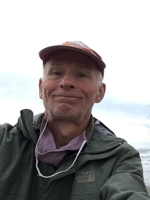
The Smoke of August
by Mark Simpson
Mark lives on South Whidbey Island in the Maxwelton watershed near the confluence of Maxwelton and Quade Creeks. The water flows directly into Puget Sound, about a mile away. The land where I live is steep, heavily glaciated, and forested. The last glacial retreat left mostly glacial till – boulders and rocky debris. Melt water from glaciers (my guess) has cut five crevasses 20 to 30 feet deep. Dominant trees: Douglas Fir, Hemlock, Western Red Alder. It's beautiful, and my apple trees look to have a good showing this year.

It begins like dusk arriving on city streets
in the way country roads digress
to fields of stubble, or farther, to a sea.
It slides through trees, lingering.
It rubs itself against leaves and stems and becomes
itself not a night or day but a sleep, a thing
that comes and sleeps.
The air is tedious with a light made yellow
by the air. It seems peaceful then, brings a sound
almost there, beneath the breath,
remembered like a childhood prayer.
This thing we’ve made makes our
going cautious, although we do not see
beyond the hills. The hills themselves
we remember as always there, like a universe
or a grocery store with shelves once stocked
richly in colors we adored.
© Mark Simpson

An Elegy for Franklin Ware, Dead before the Fire Came
by Mark Simpson
Mark lives on South Whidbey Island in the Maxwelton watershed near the confluence of Maxwelton and Quade Creeks. The water flows directly into Puget Sound, about a mile away. The land where I live is steep, heavily glaciated, and forested. The last glacial retreat left mostly glacial till – boulders and rocky debris. Melt water from glaciers (my guess) has cut five crevasses 20 to 30 feet deep. Dominant trees: Douglas Fir, Hemlock, Western Red Alder. It's beautiful, and my apple trees look to have a good showing this year.
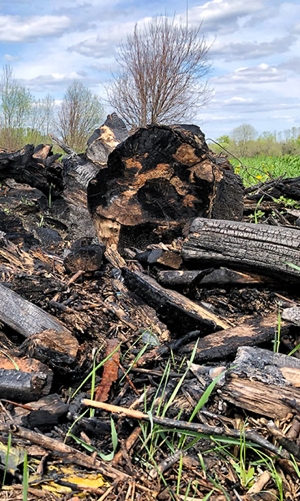
The fire burned your place,
the black timbers themselves a late elegy—
you’d been dead three years by then.
The fire snaked past Index, up
the county road, jumping Troublesome Creek,
the sound of the falls there burning, too.
It burned your place and all the stuff
you’d left, the stuff no one wanted—
your notebooks of plans and possibilities,
a table, a broken chair.
Good riddance to it all, I think you’d say,
good riddance to the four-wheel drive
to civilization—a place to buy beer
and cigarettes, sugar, salt, and
whatever you needed to patch the roof
when it began to leak.
Good riddance and no regrets and what
were you doing there, anyway?
The fire sluiced up the canyon, up
mountainside, trees and brush primed
and ready for it.
This year, another fire burned it all again—
amazing how hungry flames can be, consuming
the consumed, making sure, cleaning up, a
consecration of the nothing left.
Troublesome Creek ran dark with ash
for months. The perfection of the burned,
how pure it is: no place to stay, no place
to start again.
© Mark Simpson
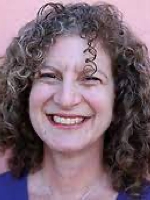
Jewel Lake, 1994
by Allison Luterman
Alison lives on unceded Ohlone land near the Peralta, Lion and Sausal Creeks, about fifteen minutes down the hill from Redwood and Joaquin Miller Parks, where she hikes often.

I used to take the neighborhood kids
up to the Little Farm in Tilden Park,
back in the nineties,
after I'd split from my first husband.
The cow was massive and calm.
she chewed her cud, she ruminated,
extending her long rolling tongue
which was a brownish purple, rutted as an old road.
It terrified five-year-old Patty who clung to my waist
while the goats butted up against the fence, slot-eyed and voracious.
Abraham tickled their noses with long blades of grass.
I told him not to tease them, so he did it some more.
I have no pictures from those days--I didn't
own a camera, and there was no husband or lover
off in the wings, framing shots. No cell phone with which
to snap a selfie, no Facebook to post to and say Look at us!
Sometimes we went to Jewel Lake and waded in,
letting minnows nibble the fine hairs on our calves.
No one knew where we were or cared.
I ventured deeper and deeper and stared
at my wavering reflection in green water.
Nothing buzzed or pinged in my pocket.
All was quiet save for the shouts of the children
skipping stones and scaring the fish.
First published in Catamaran Literary Reader
© Allison Luterman
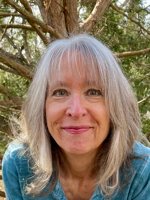
Not the War
by Brett Warren
Brett lives on a sandy peninsula in the Outer Lands archipelagic region of the Atlantic Ocean, where she walks in the forests and edge habitats of the Wequaquet Lake watershed. Her house is surrounded by pitch pine and black oak trees—favored nighttime roosts of wild turkeys, who sometimes use the roof of her writing attic as a runway.

Stunning, the sight of her, staring down,
so wholly focused she doesn’t see you,
though technically you are the enemy.
The fox is blocking the trail, stock-still
in dazzling light that comes from the sun,
not from an explosion. Her ears
are cupping forward, twin sensors trained
on signals transmitting underground,
not from safe room or subway station,
but from an earthen tunnel
that is smaller than your naked wrist.
She haunches back and launches,
front feet first and then all four paws,
airstrike aimed at mole or vole,
not a hospital where babies wait in rows
of incubators,
not an apartment building where people sleep
and wake and make dinner.
The fox misses her target, notices you, spins
into copper and black velvet,
burnishing into the understory. Breathe, now
that you can, and know the fox is already
forgetting you, which is a kind of beauty
too, how trivial you are.
The fox will spend her whole life killing,
will kill intensely and without hesitation,
today and every tomorrow she is given.
If she is driven by some fox-god
who tells her what to do, her religion is not
like ours. Her killing will never
be hateful or pointless or ideological.
Not once. Not ever.
© Brett Warren
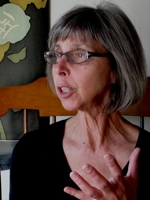
Oh, the Beautiful Green Grass. 1999
by Laura Budofsky Wisniewski
Laura lives in the central Lake Champlain Valley, in the Lewis Creek Watershed, a lovely little tributary of which runs through her land. The plants and wildlife of Lewis Creek are currently being threatened by a drastic rise in housing and commercial development.

Oh, the beautiful green grass
of Mr. Glanner’s yard and, oh,
it siren-sang, as grass does,
all down Tilman Hill to the pig
owned by Miguel, the Willette’s hand,
and his wife, Suzanne, struck suddenly
by unfamiliar kindness in her third trimester,
so that the pampered pig was fat and curly-tailed
with high tastes for sweet pie and the world,
magnanimous, and maybe the gate, fashioned
in haste, was loose or maybe the pig was clever,
but one clear thing, he, mortal as a planet of the sun,
was more himself than ever he had been,
prancing like a dancer, past the Roes and Maskys,
the Gesh’s compost treasures, further, further, nostril-led,
soul-driven, to the Glanners’ grass, so green, so green
and new and tender and oh, finding it,
dug a hole, then two, then ten as if the underworld
were filled with truffles, not devils.
Comets of sod streaked across the cloudless sky.
Glorious grunts sounded. The baby’s head engaged.
© Laura Budofsky Wisniewski
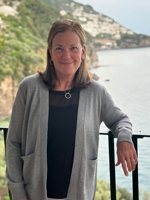
Motherhood
by Amy Allen
Amy lives on Shelburne Point in Vermont, a narrow strip of largely undeveloped land populated with everything from bobcats to porcupines, bordered by the expansive waters of Lake Champlain on one side, and the small, sheltered inlet of Shelburne Bay on the other, over which a wide array of birds commute—from lake to bay and bay to lake.

Her ears are like broad mussel shells
jutting out from her head—deep and alive
flickering in a syncopated rhythm
with the swish of her tail
the blink of her eyelashes
the flaring of her nostrils
the shifting of her hooves.
Her calf seeks shelter against her
no longer able to sidle underneath.
Today the farmers will separate them—
far enough to prevent nursing
close enough for both to hear the wailing—
the calf bawling for the loss of all she knows
the mother howling at the despair of not providing.
That night you lie atop sheets in summer’s still heat
arise and slowly pull the windows shut.
© Amy Allen

Garden Date
by Amy Allen
Amy lives on Shelburne Point in Vermont, a narrow strip of largely undeveloped land populated with everything from bobcats to porcupines, bordered by the expansive waters of Lake Champlain on one side, and the small, sheltered inlet of Shelburne Bay on the other, over which a wide array of birds commute—from lake to bay and bay to lake.

In the heat of July
you led me to where
the rhubarb pushed up
next to the old stone foundation,
its broad green leaves
shading crimson below
like celery steeped in red food coloring.
You pulled a stalk from the dirt
broke it in half and placed it in my palm.
I held it tart against my tongue
met your eyes as my teeth sank in.
After weeding and watering
you led me to the cellar
where it was dark and cool.
Your worn hands pushed the
hem of my dress
up around my hips.
I could hear the sparrows
and smell the earth
and everything
was dripping with sweetness.
© Amy Allen

Being There
by Ronald J. Pelias
Ron recently retired from the University of Louisiana where the cypress trees stand like old wise men with their moss beards hanging almost to the level of the waiting water. Allegators and turtles gather together at their base seeking the comforting sun.

Wind rocks the oak tree
in my backyard, gentle
as the moss swinging
from its broad shoulders
and thin fingers. The bare
ground beneath, damp
from a hard overnight rain,
seems rich, ready
to welcome new life.
A few fallen branches
rest in the bare dirt. Soon
they will begin to rot
become a home for some
small creature, one
I probably will never see.
The eager sun insists
that the leaves glisten.
Each one turns into
a small mirror of light.
My neighbor’s roof
is beginning to dry.
His honeysuckle, in full
bloom, hangs over
the old fence. Beyond
the morning dove’s echo,
there is a calm.
I brought the paper
out to read, but it sits
on the table next to me,
still wrapped in its plastic bag.
The morning is already full.
© Ronald J. Pelias

To the Eyeless Wolf Spider of Kauai’s Lava Tubes
by Derek Otsuji
Derek lives between the Ko‘olau Mountains and Kewalo Harbor on the southern shore of Oahu.

An age ago you traded in the sky
For a roof of stone and the changing light
Of days and hours for one unbroken night,
Scorning the bright pageantries of the eye;
Grew tactile hairs by which to amplify
Sound, so the slightest movement will excite
Your senses, quicken the appetite
To home in on and seize your prey thereby.
To know the world by touch by taste by smell.
To map by memory the blank terrain.
To measure time by droplets, like a bell
Tolling sunless hours of your dank domain
Through which you move unhaltingly, though blind.
Dark caves lit by the deep eye of the mind.
© Derek Otsuji

To the Hawaiian Goby
by Derek Otsuji
Derek lives between the Ko‘olau Mountains and Kewalo Harbor on the southern shore of Oahu.

Little goby fish, wholly admirable
for endurance, agility and sheer
gumption, among the finned folk without peer,
famed for a feat scarcely imaginable,
proving even waterfalls navigable
—evolution’s trick, by which you adhere
to the rock face, inching up, until you clear
the vertical drop, that unfathomable
sky-deep hurdle, and arrive in clear streams
that were the stuff of your prenatal dreams.
What unseen mind or hand guides this migration,
whose only end and final explanation
must be, however far we stray or roam,
that instinct never fails to brings us home?
© Derek Otsuji
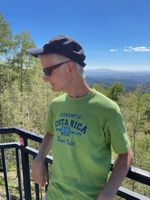
What We Created When We Created the Brilliant Sky
by Ken Holland
Ken lives in the mid-Hudson Valley within the Hudson River watershed, which covers over 13,000 square miles. As the river approaches NYC, a sheer cliff of rock rises along the west bank, the Palisades, remnants of when the land was uplifted via massive volcanic and earthquake activity at the end of the Permian Period 250 million years ago and believed to be one of the great extinction events of this planet. And here we go again...

1
Only I’ve learned to say sorry in so many tongues
Dispiacere, desole, siento,
And still it is not enough
Je suis desole
You the sorrow that broke to flame
Who swept the high hills on rainless wind
Blackened memory with the heat of your hand
In thrall to your own aberration.
2
The dark declining shelf of the sea kisses you away
The heat of your body flickers within the black weight of water\
The julep gloss of your lips in last fluorescence
You are the earth warming, with or without my pity
Your slow immersion
The last brilliant glimpse of a wavering sky.
© Ken Holland
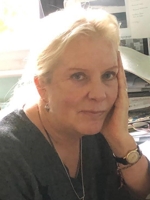
Wet
by Sue Proffitt
Sue lives in Hallsands, a remote settlement and beach situated in Start Bay, South Devon, England. Her favourite walk is from her cottage to Start Point, one of the most exposed peninsulas on the English coast, running sharply almost a mile into the sea. The lighthouse at the end of the headland has guided ships in passage along the English Channel for over 150 years, and the coastal cliffs are the oldest in Devon. The coastline here is still wild, and home to many wild flowers, birds and animals.

The world’s burning, I know it.
Forests, fields on fire
reservoirs, rivers running dry
but I know this in my mind,
the part that’s separate
with a door that doesn’t quite
close. I keep my knowing
in there but when I walk
past a bit-glance sideways
through the gap shows
fish flailing, mad shadows
in orange glare, bone-
sculptures on sand,
the groan and crack of ice.
My body knows the world’s
burning. Before I open my eyes
I hear heat – stretched silence,
no birds. Sky like a wire pulled
tight. Soaked in my sweat
like meat marinading,
sun’s weight a butcher’s
tenderiser poised over
my head and nothing wet
is happening, nothing is falling,
nothing at all. The garden’s throats
are closed. Even the sea
is dull – drained of light –
each wave collapsing on itself
because there are bigger waves
coming – remember how air smelled
after rain? I couldn’t breathe it in
deep enough. Remember wet?
How skin shone, earth eyed in puddles,
each leaf a mirror, remember
how your feet on damp soil
sank into it like fingers pressed
to skin, how wet took you in
and cooled you with her breath
like a mother? Remember manna,
what falls, we called it grace,
remember lifting your face,
your mouth opening to drink?
© Sue Proffitt
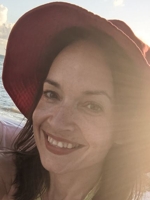
Bull Shark Scuba Dive
For Octavio
by Courtney Hitson
Courtney currently resides in the southernmost point of the United States. Every day, the island manages to upturn a new surprise—be it a sunset of unfathomably fierce color or a batch of nurse shark pups swimming along the pier. The planet’s precarious situation displays itself more and more, each season. She uses poetry as a means to deal with this reality.

With a bucket of dead fish, we drop
into the estuary as they unwind
idle circles around our path.
We’ve become rote,
as in remembered, meaning
that I mingle in this soul’s
grey head with fleeing marlin, maimed
octopuses, and a lineage, coded
450 million years long.
The sand exudes a sacredness that I’m hesitant
to embrace. See, sharks survived all,
five mass extinctions. Unsaddled
by stockpiles of selves or compasses, overstuffed
with needles, they’ll likely outlive us.
The campy bite of a movie
poster’s garland—bloody teeth decked
in menace—pales to these masters, looming
beyond every apocalypse.
I write this poem 7,000 feet above the earth
where a seatmate cranes to watch
my videos of the feed, Octavio dangling his halibut
like a matador. The 747’s silhouette graces
the ocean—our own pelagic shadow, grim and bound
for the city.
© Courtney Hitson
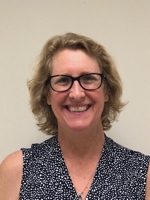
The Turn of the Snail
What happens if we create an ark where
the passengers can never get off? -Thom Van Dooren
by Wendi White
Wendi writes on the brow of Wa'ahila Ridge on the island of 'Oahu in the ahupua'a (land division) of Waikīkī along the musical waters of Mānoa stream.

The land whispers stories,
for centuries has sung
in the key of auger shaped snails,
Kāhuli, who once performed
a seemingly ceaseless vine of song,
fugue of leaf-glide and decay-sort
that led to sprouting.
Mākua valley opens its mouth
giving the people words, utters
wind that scours cliffs, hums
with birdcall, proclaims
with winter’s waters:
the forest is life.
Do not disturb
the gods’ village.
Once tree snails tipped each bough
like Kukui nut clusters, now
only a few kinds remain,
some trapped in a box, hidden from us,
and if we don’t look inside, they may
be there forever, but if we peek,
we’ll see that many have no mates.
They wait for us to learn how to return
the forests to their home. They wait
for us to help them sing again.
© Wendi White

Losing Waikiki
by Wendi White
Wendi writes on the brow of Wa'ahila Ridge on the island of 'Oahu in the ahupua'a (land division) of Waikīkī along the musical waters of Mānoa stream.

It's a three-seal morning
at our beach where I swim,
and instead of stroking
I'm stringing a rope
across sand hoping
it will stand the day's
pressing crowds.
If you can't hold space
by your self, it must
be held by others,
as a mother cradles
a babe or a reef sets
steps for waves to climb.
But why cede half our shores
to creatures of another kind?
We need what’s left of Waikīkī
for towels and tents.
Our hammocks must swing
on palms we think we own.
Why retreat, why share
what little remains
of this fantasy island?
I swore this when Maui burned,
when the sun’s iron scorched
the land to rid her of our wrinkle,
reducing a thousand years
of human history to ash:
If all I can do is make way
for pinnipeds to molt, mate
and pup another season,
then I will grow old in that effort.
© Wendi White

When the Old Place Went
A Tribute to “Woodland Gate”, Mangalore
by Geralyn Pinto
Geralyn lives in Mangalore between the sub-tropical splendor of the Western Ghats of peninsular India and the great expanse of the Arabian Sea to the west.
in a shiver of flaking lime and brick, its last pillar stood as if to dare
the men in metal hats who clutched papers with
blueprints of death of houses, groves and garden
hedges.

To its companion herbage,the pillar was
another kind of tree where insects
puff-balled under cornices and
paper-skinned geckos refuged on
thirst-wracked afternoons.
Then the pillar fell to market forces. Its
plum-cake insides spilling out, it awaited
departure to a Green Hereafter; while the
trees gazed joyless at a ruined house and
garden.
When the season of ripeness came round,
only one tree stood, its leaves ignited by the
sparking heat of summer. But the men, slurry
steaming off their skin, toted up the sum of
their profits.
They didn’t see grass scribble between stones,
shrubs leaf out, wild and unsymmetrical, or young
twigs rasp on glass,
while old roots stealthed through loam, in
inching reclamation.
But the last tree saw this and died into a dream
where weeds strike through laterite, looping
tendrils live-wire open windows, and, outdoors,
ripe mangoes set fire to their trees in April.
****
Note: Our ancestral home ‘Woodland Gate’, like several old bungalows in Mangalore, is up for sale and will soon be demolished. Many have already met that fate; their owners having passed on and the younger generation moved to big cities, or countries abroad, in search of a more lucrative way of life. Land developers and real estate agents descend upon these venerable edifices, snap them up and reduce them to rubble. Concrete, steel and plate glass monstrosities stand tall on the graves of homes and gardens where love once ruled. This poem is a tribute to ‘Woodland Gate’ and all old Mangalorean houses.
With the ‘death’ of these bungalows not only has a whole gracious way of life retreated into the mists of Mangalorean history, but also a more nature-friendly existence has come to an end.
Interestingly, it was in the very material of which the houses were built that their eco-friendliness was most evident. The walls and pillars were made of red-brown mud mixed with unrefined palm sugar, called jaggery, and broken sea or egg shells. If a wall or pillar broke, and they rarely did, the insides looked exactly like rich plum cake. The pillars and walls of the rear of ‘Woodland Gate’ have borne the onslaught of over a hundred monsoons, and remained rock steady. It will take a demolition squad only a few days to accomplish what nature refused to do...
© Geralyn Pinto
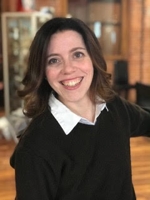
American Sonnet in Rome
by Daisy Bassen
Daisy lives on the west shore of Narragansett Bay on land that was originally home to the Pequot.

We are still arguing about the bees,
how they cannot be more real than real,
taking the remark as a pronouncement
when it may have only been a poor translation,
thought to word, word to word,
sight to perception, particle to wave.
We didn’t discuss how few bees roved
through the carefully wild flowers,
but we watched a bee sip from a drop of water,
shaking its ass, thirst so basic we understood
without an interpreter. What has been lost
is all around us, distant as our sweat becomes
filling the air, a heady cologne scented
then gone beyond recall, too quick to sting.
© Daisy Bassen

Stung
by Daisy Bassen
Daisy lives on the west shore of Narragansett Bay on land that was originally home to the Pequot.

It’s possible that bees, in great profusion,
would still scare me the way a single bee did
when I was a child, but I’ve learned to count them
when I’m in my garden and walking through
my neighborhood; I’ve learned to worry
when I see one paused, still on the asphalt.
She might not fly again.
When I was younger
than my youngest child, I was stung
by a drowning bee, my hand final in the way
the water wasn’t. I held it against her
but mildly, my hand swollen for a week, made
a boxing glove despite salve, ice. A knock-out,
when I couldn’t have saved either of us.
I’d look at her now, too heavy to rise, beyond
rescue, and I’d say One not I’m sorry.
The stamens she wouldn’t visit would be legion.
© Daisy Bassen

Seabird
by Samantha Imperi
Samantha lives in the foothills of middle Appalachia overlooking the Hocking River. She and her tiny dog walk several times a week to the top of Radar Hill to see the sunset.

It is June on the California coast and I watch a seabird
peck the sand for morsels left behind by a mass
of bodies that fill the landscape with flesh and fabric,
the refuse of humanity falling from their fingers
into the beach in forgotten scraps and shards that glitter
like treasure along the shore. I remember
an image on the internet of a dead seabird
cut open to expose a distended belly full of trash
indigestible plastics and the bright metallic
of a torn granola wrapper. It died of starvation
in a body so full of nothing that it burst.
I’ve never forgotten the array of bottlecaps and soda tabs,
cigarette butts and shiny plastic straw wrappers
that littered the autopsy, the way it must have kept eating
and eating until its stomach could stretch no more
and meal by meal, its body drained of life
like water leaking from the well. I can imagine
the day it laid itself down to rest, betrayed and broken,
too heavy to fly, a body less body than burden, wracked
with pangs of angry hunger and the injury of indulgence
expanded inside. I wonder about the ignorance of a bird
to die, silently, unknowing, like laying down to rest
after a long flight, like wishing for relief and receiving it.
On the beach in June I am smoking a cigarette,
drinking a can of soda. I watch the seabird
find something small, and head back, swallow it whole.
© Samantha Imperi
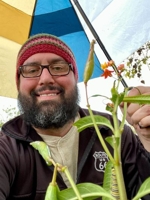
Elafonisi
by Jacob Friesenhahn
Jacob lives in the Cibolo Creek watershed. He lives along Elm Creek, a tributary of Cibolo Creek. These creeks are like nature's highways, though without the great destruction caused by humanmade highways.

The tourists pour in all day now.
Their cars brave as mountain goats
climb the treacherous hills.
There are parking lots everywhere
and a huge new hotel.
The pink sand is still here
glowing like a light sunburn
where the sea hits the shore.
There are signs now
legislating as best as they can:
You must respect this place.
You must not take the sand...
back to your homes
where it loses its magic
kept on your mantel in a jar
or forgotten in a drawer.
The pink sand is still here
though some say it’s not really pink
it’s white just like the rest
dyed by pigments squeezed
from the crushed bodies
of organisms too small to see.
I have not been here for ten years
or eleven or twelve maybe.
I think of the changes
what has been taken from me
who walks this beach alone.
I pass more tourists.
They hold out their phones.
They haven’t been told –
the pink sand cannot be recorded.
The sand needs salt and air
water and sun and breeze
to blush in innocence.
I kneel down slowly.
Even in my hands
even before it falls
through my fingers
the sand is intangible.
It is still here.
© Jacob Friesenhahn

Humidity
by Alan Perry
Alan lives in the City of Lakes, which borders the northern end of the Mississippi River.

In the heat of summer
water vapor lingers,
fills the wood of the shed door
I struggle to open.
Our annual tug-of-war
signals I’m late
to level weeds who enjoy
the sultry damp of mid-afternoon,
showing off their dandelions,
clover and quack grass –
attempts to reclaim native prairie.
Like the door, they know
I’m coming for the scythe
locked up with other yard arms –
mowers, edgers, weed whips.
But this year, the door
is especially swollen, engorged
by a heat index that stifles
my ambition. Which gives me
pause to notice weeds
have overgrown my path,
inviting me to sit down
among the ground cover –
let the future swell.
First published in Third Wednesday, 2022
© Alan Perry
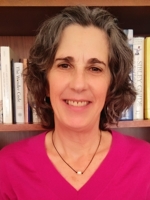
Talking to Children after all the Bees are Gone
by Sharon Pretti
Sharon lives on the border of the Pacific Ocean where she frequently walks and watches birds. Across the bay, she enjoys the Marin headlands and the beautiful and bountiful trails of Mt. Tamalpais.
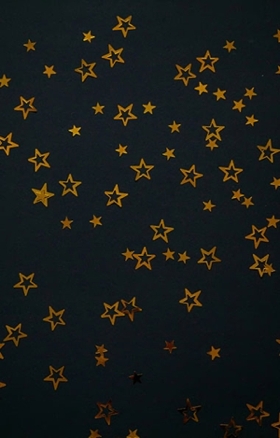
How will we tell them about the air,
its hum fringing ceanothus in spring,
the sleeveless path we followed as if
apprenticed to every season we walked into?
When we quiet them and their faces
tilt like the moon towards us, how will we
convince them translucent = wing?
A photo? A drawing from memory of Apis mellifera?
How to make real the worker bee’s
waggle dance, the distance before lavender
is reached, its odor astir on the antennae?
Who’s to say our children won’t clamor
for a compound eye, 6500 facets to imbibe
the world from above, below, to the side?
Our daughters and sons demand the fantastic—
sticky pads at the end of each leg so window glass
can be climbed, the underside of a slide.
Their bodies believe in us,
small boned, able to collapse against our chests.
We unpucker a sock, glue stars
to their ceilings hoping to disguise
the holes we’ve left in the sky.
We’re practiced in the past tense—how pollen
was combed into the corbicula. Again,
they insist, not yet asleep, their eyelids
uncrusted, that story again.
© Sharon Pretti
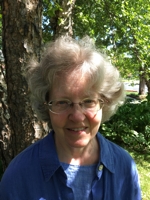
Imagine Rain
by Charlotte Melin
Charlotte lives on the Cannon River, which flows into the Mississippi south of the confluence with the Minnesota at Bdote Minisota, a Dakota sacred site.

Imagine velvet dark
wakes you with the light
percussive touch of
raindrops and even before
your eyes open, you smell
the earthy scent of moist
dirt, sense the spreading
green of moss,
the push of small leaves
upward that transforms
sweet soil after
a long dry season.
But that rain doesn’t come.
© Charlotte Melin

Rampant Garden
by Charlotte Melin
Charlotte lives on the Cannon River, which flows into the Mississippi south of the confluence with the Minnesota at Bdote Minisota, a Dakota sacred site.

No room for me in the garden.
Wild clematis, phlox, joe pye weed
run rampant, crowding up
next to helianthus, goldenrod,
red bee balm and daylilies.
I’m losing ground to
creeping bellflower, bindweed
and tree seedlings randomly
sowed, especially walnuts
and hackberry. If I did not know
them by sight, they’d be
nothing but weeds, yet as is,
there’s no extirpating
things you can name.
© Charlotte Melin
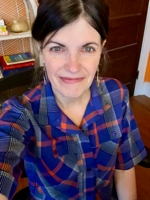
That We Don’t Move Fast Enough
by Michelle Hendrixson-Miller
Michelle wakes up just a few hours from the Great Smoky Mountains every morning. She can be found on weekends kayaking the Duck River, one of the most biodiverse rivers in North America. This waterway contains several species of freshwater life, like the pearly birdwing mussel, found nowhere else on Earth.

That even now, people who love, drown
on the edges of Appalachia. That grass here
browns and cracks while I cautiously wish
for rain. That my long list of things to do
will change nothing. That zinnias wither
in beds like underpaid garment workers.
That I cut and pile them in the yard—
grave of flowers marking their own grave.
That I was eleven when I fell in
a river. That I clung to a limb as a boy
my age rushed to pull me back. That
I looked it up—it takes twenty seconds
for a child to drown. That either
we get it right now, or we don’t.
© Michelle Hendrixson-Miller

Melipona Gold
by Karen McAferty Morris
Through live oaks with twisted trunks, Karen’s backyard view is Perdido Bay in the Florida panhandle. From her swing overlooking the water, she can watch dolphins and great blue herons.
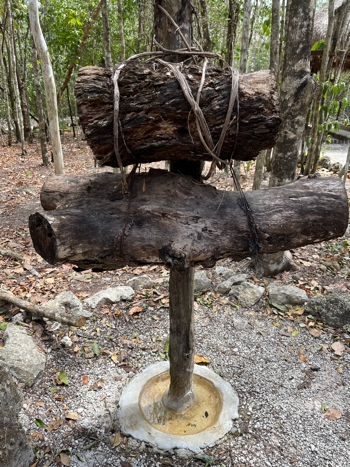
The Mayans held them sacred,
the tiny stingless bees, believing
they flew up to the gods and brought
the golden liquid to mortals.
At the small bee sanctuary in Cozumel
we listen to an incantation in the ancient
language, and breathe dense smoky incense
in a cleansing ritual, then proceed
to another thatch-roofed hut sheltering us
from the blistering sun.
There, inside short pieces of hollow logs,
a dozen hives thrive in darkness.
Some are suspended by ropes,
others mounted on poles.
Only a tiny slit allows for the comings
and goings of the pollen gatherers
who hunt hibiscus and other tropical flowers.
Each hive has three queens, against risk.
The thin honey is not intended
for sweetening food or hot drinks,
but a drop in the eye or on a wound,
perhaps a spoonful each morning, is curative.
A small number of women
on the Yucatan mainland tend
to most of such hives, dutiful women
who work to ensure these endangered bees
can continue to make their healing honey,
balm to a damaged world.
© Karen McAferty Morris
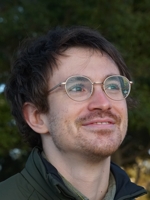
Red Panda
after William Blake
by Bradley Samore
Bradley currently lives in a plains region where some tracts of forest and waterways still exist. Tornados, hail, high winds, and hot summers travel through the region. Some of the animals seen in the region include the eastern cottontail rabbit, mockingbird, bobcat, coyote, cardinal, robin, crow, and grackle.
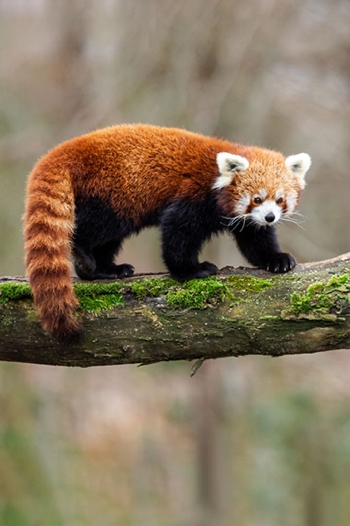
Innocence
The rain is coming. For now,
I graze bamboo for myself
and my cubs who doze in den
of deadwood and leaves,
not yet ready to open their eyes.
But as late June Julys into August,
the monsoon will blossom
kiwis, rowanberries,
white beans even —
a season to gorge us.
My cubs will follow my tail
wrapped in ringlets of umber,
my black legs and belly
along the undergrowth,
my marmalade fur
into emerald branches.
Experience
Our time is crepuscular.
The yellow-throated marten
and snow leopard hunt us
teeth to flesh: mortal intimacy.
When will you meet me
at the edge of the river?
When will you ford
Disneyfication,
your dam walls,
the fragments of forest?
What is the sum
of your fractions?
© Bradley Samore

Armadillos, Motherhood, and My Divorce
by Isobella Jade
The arboretum near Isobella's home in Houston gives her a glimpse of the wildlife that live in prairies, marshes and woodlands in the Gulf Coast region. She walks and writes in her journal among the tall loblolly pines and bald cypress trees that line trails and ponds. It's a normal thing to see hawks, herons and egrets, or spy a broad-banded water snake.
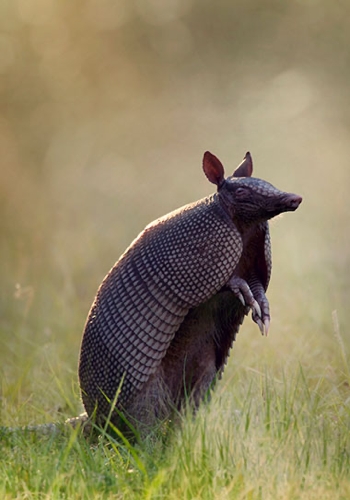
In their burrows down under the earth four armadillo pups are opening their eyes. They do not know about the purple and yellow wildflowers and new life that is blooming above them. Once the babies have emerged into their new world, their soft shells will begin to strengthen over time and become protective shields from any harm. Their mother will be their support, their supplier of nutrients, their eyes. The pups will soon walk on the mulched trails I’ve been walking upon, existing among the tall pines, the ponds and lilies, the blue sky.
The first time I saw an armadillo at the arboretum, I noticed how it worked alone. It was so focused on diligently devouring bugs, beetles, spiders, ants, worms, snails and other grubs for nourishment as though nothing could sway its determination to succeed. And I identified with that.
Since then, when I see an armadillo out in the forest, I always assume it is a female, a mom rooting around by herself, doing the best she can. This thought alone has helped me find healing from longing for my kids, whom I am only able to see every other week. When it isn’t my week, I focus on the invisible connection my children and I share, and I walk out hopefully to look for an armadillo.
I had never seen an armadillo until I moved to Houston from Manhattan, but now I see the State Small Mammal of Texas all the time.
The nine long thin lines on armadillos are like stacking rings. Noticing the intricate brown and tan bead-like design on the rest of its back, I wondered if it is related to a turtle. Looking at the plates that cover its very long tail, I could assume its gene pool includes rats that hide under the ground in New York City subway stations.
The armadillo’s strong claws help them to dig, and they spend their lives tunneling for safe space, where they sleep for half of the day or longer, only emerging to seek and gain sustenance in the early morning or at dusk. Their cute piglet-like ears catch my eye. Watching them sniff the earth with their long snouts, I might have thought they could be related to wild boars.
But I would be wrong: the armadillo’s odd characteristics, including its massive dome-shaped shell, have been passed down from its prehistoric origins from the great glyptodons. As the armadillo bows its head to dig at the soil near the ponds with muddy claws, I think about its fascinating origins.
The sounds of the armadillo making a racket in the woods at dusk, snuffling the ground in the forest and ignoring passing trail walkers make me smile and feel uplifted somehow.
Often it is just us: the armadillo and me, two moms in the prairie or woods under the tall pines, busy doing our work. Mine is more internal, thinking, processing, accepting where I am now, figuring out my direction. Her work is within the earth, digging for nutrients to sustain her and her babies.
I stare at the armadillo, scurrying around in the brush and long grasses, sniffing below the pine trees for bugs, exploring fallen branches, and pausing to dig a hole. She’s a curious creature, a peaceful wanderer, making her way in the world without full sight. Armadillos lack light-detecting cells and have blurry, colorless vision. Despite her poor eyesight she’s driven forward, digging her holes away from predators.
Baby armadillos have bad eyesight like their mother, but they find their way and thrive upon the earth just the same with the devoted care of their mothers. The armadillo pays no attention to me in its persistent digging and tunneling. She doesn’t look back, only focuses on what’s ahead. I try to take my cue from her and focus on what’s in front of me to create a new vision for my future.
© Isobella Jade
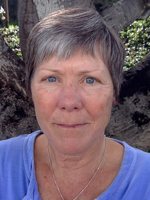
Summer Solstice
by Monica Stillman
Monica lives next to the Pacific Ocean where a steelhead stream runs down from the oak- and sage-covered hills to meet the sea -- moving waters, migrating sand, and bird calls.
Today light filled the sky before my eyes could see
a reflection of how small we are
I step from stone to stone to cross the creek
recalling all my strengths and frailties
We are not the center of the universe,
we lie cradled on a distant arm
Cosmos track the sun like hope-filled faces
I try to follow
In ancient times today the sun would shine through sacred stones
reminding me of modern hubris, how we alter fragile webs of seasons
We are not all that we deem
but perhaps we can be more
Recalling it is Earth’s tilt that makes today so wide
I consider hope
How something dear may come to tender close today
and something dear, as yet unknown, may bloom

© Monica Stillman